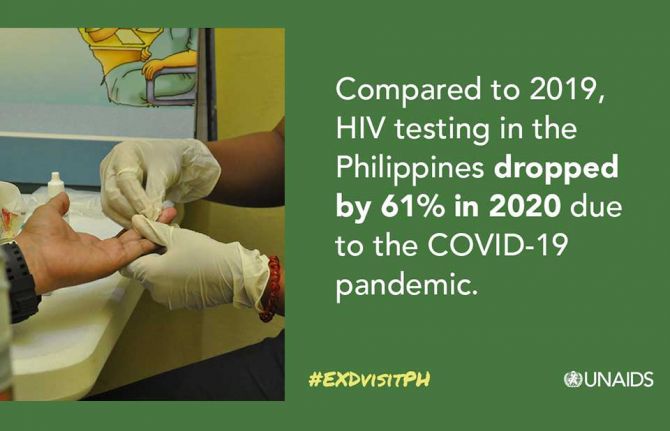

Feature Story
Community-led HIV services stepped up in the Philippines during the COVID-19 pandemic
11 May 2021
11 May 2021 11 May 2021The HIV response in the Philippines has been hit by the COVID-19 pandemic, especially access to HIV prevention and treatment services. According to the Global Fund to Fight AIDS, Tuberculosis and Malaria, in Metro Manila coverage of HIV prevention services for gay men and other men who have sex with men has decreased by 74% since 2019. Government figures show that compared to 2019, in 2020 HIV testing decreased by 61% and enrolment in HIV care reduced by 28%. The COVID-19 pandemic has drawn attention to socioeconomic divides, highlighting failures within the health system to adequately deal with not one pandemic but two.
Despite this, what has been clear from the onset of the COVID-19 outbreak is that civil society and communities have stepped up to the challenge to provide HIV services while navigating through restrictions on movement and lockdowns. One example is the Family Planning Organization of the Philippines (FPOP), a civil society health service provider and advocate of sexual and reproductive health and rights with a network of more than 1000 community-based services across the country. One of those service providers is the Rajah Community Center, a primary HIV clinic located in Iloilo City in the Western Visayas region of the Philippines, which provides HIV services for key populations, including young key populations, in a friendly and stigma-free environment.
“When I tested positive for HIV, I knew nothing about it. I did not know how to protect myself from it and talking about sex was taboo in my house. My friends and I were clueless about condoms,” said Jhenard Jude, a young person from Iloilo City. After receiving his positive diagnosis, Mr Jude learned about the Rajah Community Center. “I heard from my friends that Rajah provides youth-friendly services. I was worried about how others would look at me because of my status, but the staff at the clinic were non-judgemental and very friendly. I was given a care worker who supported me every step of the way to access antiretroviral therapy,” he said.
“This is home to me. I got my HIV self-test kit here in June 2020. Rajah is safe and convenient,” said Lloyd Legario, a young person who regularly visits the clinic for HIV testing and prevention services.
Winnie Byanyima, the UNAIDS Executive Director, has been learning about the Rajah Community Center during a two-day virtual mission to the Philippines to engage with communities, civil society and the government about the country’s response to HIV and COVID-19. During her virtual visit, Ms Byanyima was given a pre-recorded tour of the community clinic and had an open dialogue with Mona Liza S. Diones, the Chapter Program Manager of FPOP Iloilo, Robert Figuracion, the Rajah Community Center Clinic Officer, and three clinic clients from key populations.
“I had the pleasure to speak with some very courageous people who were very open about their experiences at the Rajah Community Center. I extend my deepest gratitude and solidarity to community-based organizations and frontline workers for stepping up and providing essential services during COVID-19,” said Ms Byanyima.
To ensure the continuity of HIV services during COVID-19, FPOP Iloilo worked closely with the Philippines Department of Health, local government units and other treatment hubs and support groups to serve key populations and people living with HIV. Blended services that included online counselling and onsite services covered prevention commodities, testing services, treatment and medical care. This also included providing psychosocial services, which have seen a sharp rise in demand since the first COVID-19 outbreak. Telemedicine and mobile clinics became new channels for differentiated care. Innovative programmes to deliver antiretroviral therapy to clients were established and pre-exposure prophylaxis (PrEP) and condoms were frontloaded to community champions for distribution.
During the virtual visit, Ms Byanyama also learned about the HIV & AIDS Support House (HASH), another renowned community-led service provider, which in coordination with the Department of Health has worked to prevent disruption to HIV services during COVID-19. HASH offers community-based screening, PrEP, HIV referral services, medical assistance to children living with HIV and psychosocial support to key populations. “Civil society organizations were quick to respond to the situation by coming out with innovative courses of action, such as online counselling, alternative modes of antiretroviral therapy delivery and mobilization of volunteers and partners to assist those who were affected by the COVID-19 pandemic,” said Desi Drew Ching, the President of HASH.
“To sustain community-led services, government and development partners have to optimize collaborative partnerships with civil society. This will strengthen their leadership capacities and enhance civic space funding through social contracting programmes,” said Louie Ocampo, the UNAIDS Country Director for the Philippines.



